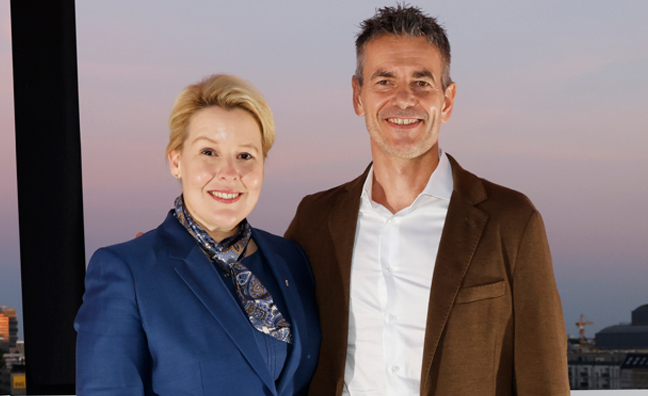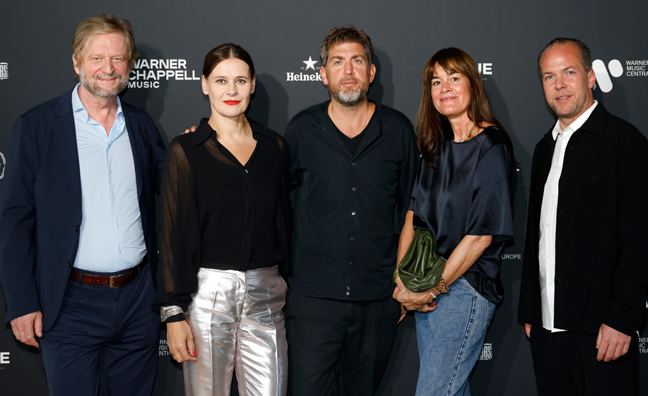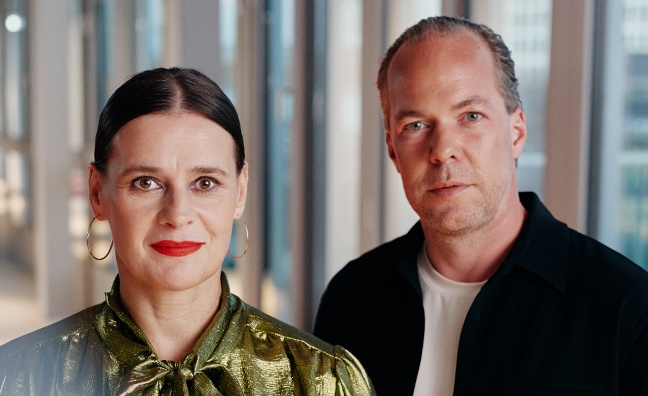Doreen Schimk and Fabian Drebes, co-presidents of Warner Music Central Europe, have told Music Week that the launch of its new creative hub in Berlin is a “historical moment” for the company.
Last week, Warner Music Group – encompassing both Warner Music Central Europe and Warner Chappell Music Germany – officially opened its Berlin office, situated on the top floor of the Schicklerhaus, a historic building constructed in the late 19th century.
Over 700 people attended the lavish event on Thursday, September 14, including Len Blavatnik, Robert Kyncl and Max Lousada as well as the deputy mayor of Berlin and senator for economics, energy and business Franziska Giffey; state secretary Michael Biel; Christian Ehler MEP; and Dr. Florian Drücke, chairman of the German Music Industry Association.

Warner Music Group CEO Robert Kyncl with deputy mayor of Berlin/senator for economics, energy and business Franziska Giffey at the Berlin hub launch (Photo: Franziska Krug)

Lars Karlsson (MD, WCM Germany and Scandanavia), Doreen Schimk (co-president, WM Central Europe), Max Lousada (CEO, recorded music, Warner Music Group), Natascha Augustin (VP of WCM Germany) and Fabian Drebes (co-president, WM Central Europe) at the Berlin Hub launch (Photo: Franziska Krug).
The hub itself, which boasts an interior performance space, four rooftop terraces, and collaboration rooms featuring Dolby Atmos® immersive sound, will serve employees as well as “domestic and international artists, songwriters, and producers”.
Music Week was in Berlin for the launch and joined Doreen Schimk and Fabian Drebes, who took over as co-presidents in 2021, for a sit down interview on the big day. The company has been very much on a roll recently, with Warner Music Central Europe currently holding a 45% market share in the Official GfK Albums Charts. Within that, they’ve had nine albums in the Top 20 and three singles in the Top 10. WM Central Europe also claimed three of the Top 5 and five of the Top 10 albums. This year, Warner Music Central Europe and Warner Chappell Music Germany also broke records with Udo Lindenberg and Apache 207’s single Komet spending a momentous 21 weeks at No.1 in the official German Singles Charts.
Warner Chappell meanwhile currently ranks as the No.1 domestic publisher in Germany. In the first half of 2023, Warner Chappell Music occupied a total of six positions in Germany‘s Top 10 singles chart, as compiled by GfK Entertainment, while their singer-songwriter signing Ayliva became the biggest artist on Spotify Germany in August 2023.
Here they talk about the potential for the Berlin hub for UK artists, the lessons that can be learned from Fred Again.. and much more…
It's soon going to be two years since you took over as co-presidents. How do you both reflect on your journey so far?
Doreen Schimk: “Well, it's been such an exciting journey being in this leadership and really trying to write this new chapter for Warner Music and also, in so many ways, not just create a new workspace, but also become a great partner for the artist community.”
Fabian Drebes: “I'm super excited about our dual leadership. I hadn't worked [that way] before and it's fantastic. We have areas each of us focus on. And as the world is getting more complex, it's so good to have a different perspective. Besides, two people can do more than one. I think this is a big win. We have different perspectives on stuff, we are different characters. That really is an advantage.”
Doreen Schimk: “It’s fundamental that you know your strengths and weaknesses. And we do. We're trying to be more efficient in terms of not sitting in every meeting together. That everybody has their specific roles is, I think, very important.”
Is the vision for Warner Music Central Europe the same in 2023 as the one you had two years ago when you took over?
Doreen Schimk: “We did have a strategy and a vision of where we wanted to be in one or two years and to be sitting here [in the new Berlin hub] is an achievement we're really proud of. From the first day, our focus was that we wanted to strengthen and grow our domestic business. We're trying to develop a growth mindset in our company.”
It's not enough to come over to the German market once, you need to really work the local scene here
Doreen Schimk, Warner Music Central Europe
With the new Berlin hub, is it just business as usual in a new space, or is this indicative of a reset and some new approaches?
Fabian Drebes: “It's a historical moment because, for the first time, Warner Music Group has a representative and creative space in Berlin and this will change a lot. We believe that creativity is best when people come together and we now have this creative hub here where our people come together with our artists and partners, and things will happen. It's not business as usual. It's a new chapter.”
Doreen Schimk: “It's all about having a space where things are happening in a very creative, collaborative way. The space is great, we can have rooftop shows and recorded DJ sets.”
Fabian Drebes: “That's a great example that came out of the team. When they saw this space, they were like, ‘Wow, this rooftop is fantastic to record DJ sessions’. We did our first session already and put it out, it's live up on YouTube. So you can see what happens with a space when people are coming up with creative ideas – we're getting these things done. Also, talking about cooperation, Warner Chappell is in here now too, and we are taking in the benefits of working super-closely together.”
Warner Music Central Europe has enjoyed some record-breaking chart success recently. What do you chalk that down to?
Fabian Drebes: “Our biggest priority when we took over was domestic growth with a really exciting international artist roster. We wanted to rebuild our domestic artist scene and that was a priority for the entire company. We made some massive changes in phase one, and now the team’s ready to deliver value for the local scene.”
Doreen Schimk: “From the first day, we communicated what we were focusing on with our strategy and our initiatives, so that everybody was on the same page. I think this is one of the keys of our success – everybody knows exactly where we're headed. We changed the entire A&R team, we changed our business modelling, changed the way we approach the market and also changed the image of being seen as a major label, because we always wanted to be closer with the artist community and to be the best partner for them so they can choose what kind of services they need.”
The opening of the Berlin hub is not business as usual, it's a new chapter
Fabian Drebes, Warner Music Central Europe
How did you go about rebuilding your A&R team?
Doreen Schimk: “When we started coming out of the pandemic, we were always aiming for getting the best talent in our company, who also have the mindset of growth."
Fabian Drebes: “We took the time to find the right people, we were not rushing, like, ‘Oh, we need someone, let's hire this person who has a proven track record’. We took the time to find people who have the best expertise in the genres we are focusing on.”
And what are the genres you are targeting? Is it a couple of specific ones, or do you want to be as broad as possible?
Fabian Drebes: “The first was German rap. Warner Chappell are the leader in our market, heavily driven by rap, so it was obvious they were the best experts in that field. So we teamed up with Chappell and the international team and founded Atlantic Germany for rap. Second was EDM. To be fair, we already had Robin Schulz. We said, ‘Okay, this is nice, but we want to grow further.’ EDM is growing internationally, it has a massive impact – everyone is going to raves.”
Doreen Schimk: “We're focusing on specialists [in dance] rather than generalists – we're really being in the niche of the scene.”
Fabian Drebes: “Other [labels] were in the partyschlager genre, and we were not. Due to the economics of streaming, these party anthems have a 12-month cycle, so we said, ‘Let’s go into that genre.’ We found the right experts with it and we did partnerships with producers from that area. We take it seriously.”
Let’s move on to Udo Lindenberg and Apache 207’s single Komet, which spent a 21 weeks at No. 1 in the official German Singles Charts…
Fabian Drebes: “This is our most successful single in Germany. And this is also a great example of our work: we want to win as a team and in this collaboration there were a lot of teams involved. It was the Apache team, it was Udo's team, it was bringing different generations together.”
What was the recipe for a 21-week No.1? Is it just a case of right song at the right time?
Doreen Schimk: “It’s definitely the song, but also the combination of two artists who, in a very organic way – that was not driven by marketing – showed their audience that they are a great collaborators.”
Fabian Drebes: “They respect each other completely, they said that to audiences and media as well, it was not a marketing thing drawn on a board.”
Was there something you were doing behind the scenes that you were particularly proud of that helped the song along the way to breaking records?
Fabian Drebes: “I’ll tell you a story. The track went in at No.2 in the charts, and we were like ‘Okay, it's a big success at No.2 – we missed No.1, but we need to celebrate a No.2, right?' But then we got a text message from Udo saying, ‘Congrats, but please don't give up, there is still a way to go’. This is something we are really proud of. You need to have the right artists with ambition, and these two artists are ambitious and they never give up. It was the same with our team, they were not really in the mood to have a party about the record [being at] No.2. It was like, ‘Okay, let's go’. The team spirit is what we are really proud of.”
Doreen Schimk: “Both artists were really pushing each other to reach the top and to want to stay there. Alongside our teams, they were asking, ‘What’s the next story we can tell?’ [to keep the single's momentum going.]”
Fabian Drebes: “What I liked on the campaign was that whenever another track came close to ours, the teams and artists came together for creative ideas. For example, they did a limited physical fan bundle with a t-shirt designed by Udo, because he's a painter as well. Then, another week, we had this limited vinyl we did for the track, which helped the push in the charts as well. One interesting thing is that both artists, separately, were not big at radio in the last few years, but they teamed up together and had a Top 10 Airplay hit. It was the first for Apache and, for Udo, the first for a long, long time.”
Moving away from domestic talent, what is the master plan for helping UK acts break in Germany?
Doreen Schimk: “Keeping the artists busy being in the market. It's not enough to come over once to the market, you need to really work the local scene here.”
Fabian Drebes: “You need to connect with the local culture, and here's one example. We just had Fred Again.. in town this week and he really connects with the local scene. His set started and he was sampling German music for his show and he's having text in German language on his screens. I was blown away. He had this vertical screen onstage and he typed and was talking to the German audiences. I was like, ‘It's a simple idea, but it has massive impact’ because you're connecting with the people in the German language. It sounds simple, but it means so much for the audience compared to someone just saying ‘danke schön’ at the end of the night.”
Doreen Schimk: “Especially in Germany, once you have the audience and once you really get connected, they're very loyal.”
One thing quite a few people have spoken to Music Week about in the past couple of years is this idea that everyone is too focused on trying to break in the UK or US, whereas there’s a strong argument from recent case studies that what's most important is you just break somewhere and build out from that. Do you have any thoughts on that?
Fabian Drebes: “You have this great opportunity now to reach global audiences and here at Warner, I think a big, big win is the robust and super-strong, super-fast global network we have. You can start in other markets. There’s the story of the Swedish rapper Ricky Rich. It’s Swedish language rap, so normally you would have said, ‘Why should that travel?’ but one part of the track was the word ‘Habibi’, which works internationally. And so the teams in Sweden reached out to us and said, ‘Hey, there's something going on, we see it on the data.’ We got a German rapper on the track and it was successful. And then it was a massive track in India, and then something was bubbling in the States.”
Doreen Schimk: “There are so many possibilities, especially with social media, to reach a global audience. But first of all, you need to know the uniqueness of the music, the talent and the fans. Every artist has so many possibilities to really become known, so it’s about finding the right strategies and taking the right steps at the right times.”
Fabian Drebes: “It's getting more complex every day and I think when it comes to new artists, you need to have the mindset to think globally from day one. We are helping artists to do the right things from the early beginning. I mean, if a German artist even has 100 fans in, let's say Malaysia, you should take care of them and reach out to our colleagues there and say, ‘Okay, what should we do to grow these 100 superfans in Malaysia to get to 1000 fans?’”
Finally, which German Warner acts have real global export potential in your eyes?
Fabian Drebes: “With the EDM roster we have, Bennett is a new artist – he’s No.1 on Spotify’s global viral chart and already charting Top 10 in other countries. Then for sure, Ayliva. She's a superstar and she's so ready for the world – she's just playing her first arena tour here. It's mind blowing.”
(Opening Fabian and Doreen shot: Maximilian König)












